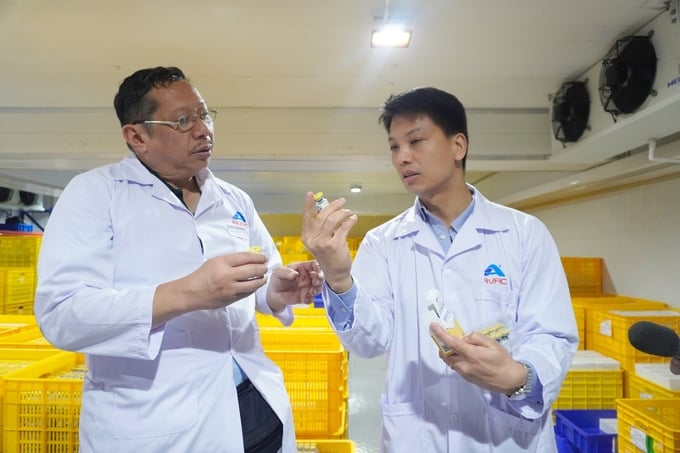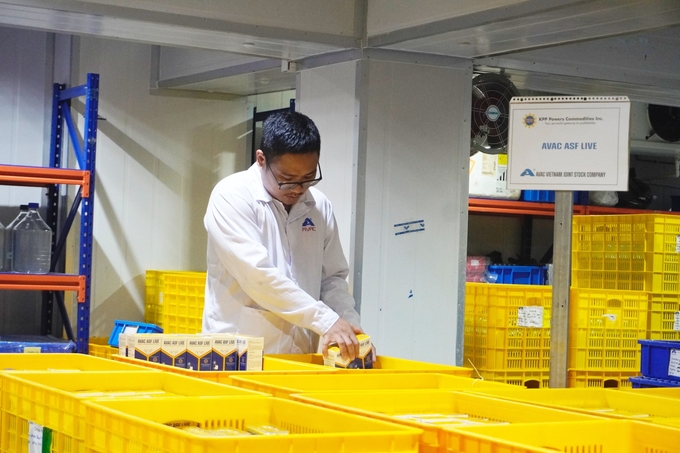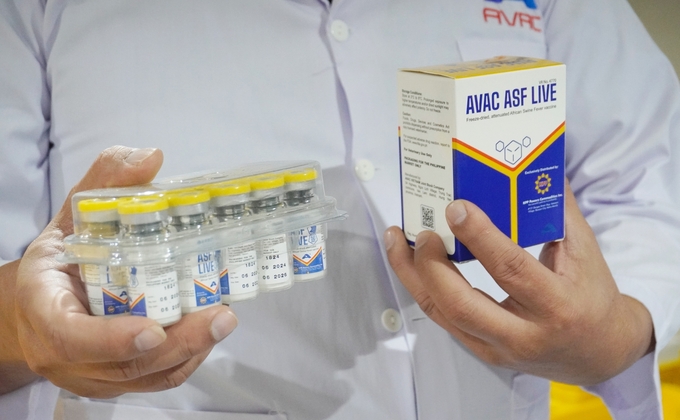June 2, 2025 | 11:46 GMT +7
June 2, 2025 | 11:46 GMT +7
Hotline: 0913.378.918
June 2, 2025 | 11:46 GMT +7
Hotline: 0913.378.918
To gain a better understanding of the potential, opportunities, and challenges in exporting ASF vaccines from Vietnam, Vietnam Agriculture Newspaper conducted an interview with Mr. Nguyen Van Diep, CEO of AVAC Vietnam Joint Stock Company. The company recently exported 150,000 doses of ASF vaccine produced by AVAC, part of a total order of 600,000 doses placed by the Philippines.

Mr. Nguyen Van Diep, CEO of AVAC Vietnam Joint Stock Company (on the right), introduces the ASF vaccine produced by AVAC to Mr. Engr. Rosendo O. So, President of SINAG - a prestigious agricultural group in the Philippines. Photo: Hong Tham.
Could you share the current production capacity of ASF vaccines at AVAC Vietnam Joint Stock Company?
Currently, AVAC Vietnam Joint Stock Company has a production capacity of 2 to 5 million doses of ASF vaccine per month. This capacity is sufficient to supply both the Vietnamese market and several countries in the Southeast Asia region.
Vietnam’s total pig population fluctuates annually at around 40 million pigs. However, the vaccination rate for ASF is less than 5%, so we expect the demand for ASF vaccination to increase in the near future.
At present, the price of AVAC’s ASF vaccine is between 61,000 and 69,000 VND per dose, depending on the volume. While this price is still relatively high, after some time when the vaccine is fully commercialized and research costs are recovered, we plan to implement a price reduction strategy that will better suit livestock farmers.
Recently, AVAC Vietnam exported 150,000 doses of ASF vaccine to the Philippines market. What is the significance of this, sir?
This event is of immense importance, marking the approval of AVAC's ASF vaccine for distribution in a second country, in addition to Vietnam.
As we know, prior to importing the ASF vaccine, the Philippines’ partners visited AVAC’s manufacturing facility in Vietnam to inspect the preparation of the 150,000 doses, part of the 600,000 doses ordered by the Philippine Department of Agriculture.
After the successful use of these 600,000 doses and the initial positive results, the Philippine government is expected to place even larger orders with AVAC Vietnam.
Moreover, this export order demonstrates that AVAC's ASF vaccine is safe, effective, and a valuable tool in controlling ASF, particularly in countries severely impacted by the disease. Many other nations are likely to observe the results from the Philippines to make informed decisions about importing the vaccine for use in their own countries.
Sir, aside from the Philippines, which countries have placed orders for AVAC’s ASF vaccine, and how do you view the opportunities in these markets?
Recently, Nigeria imported 5,000 doses for evaluation, and they have vaccinated over 950 pigs so far, with excellent results. Additionally, countries like Malaysia, Indonesia, India, Nepal, and Myanmar are in the process of registering the vaccine for distribution.
The commercial potential for ASF vaccines in these markets is significant because their livestock farming scale is quite similar to that of Vietnam, or even less developed. This vaccine is particularly well-suited for small and medium-scale farms, which may not have the resources to fully implement biosecurity measures like large livestock corporations do.
How do you assess the advantages and challenges for Vietnam in exporting ASF vaccines to foreign markets?
First, in terms of advantages, Vietnam has been proactive in researching and producing ASF vaccines. The Vietnamese government has been bold and, I would say, courageous in decisively evaluating and approving the use of this vaccine, recognizing it as an effective tool for disease control.
This strong support from the government provides a significant advantage for Vietnam's vaccine manufacturers, enabling them to compete on the international stage with a credible, government-backed product.

Workers count ASF vaccines at AVAC Vietnam Joint Stock Company’s factory in Hung Yen. Photo: Hong Tham.
With the successes in Vietnam, other countries can learn from Vietnam’s practical experience. At the same time, Vietnam will have strategic and leading products for export, paving the way for future products beyond the ASF vaccine.
Regarding challenges, some countries have already submitted applications to register ASF vaccines. However, one of the biggest obstacles is that the World Organisation for Animal Health (WOAH) has yet to establish standards for ASF vaccines. As a result, many countries are struggling to develop criteria for evaluating the vaccine before allowing it to be distributed within their own markets.
What kind of support do businesses like AVAC Vietnam need to boost ASF vaccine exports in the near future?
I believe the best way to convince companies or global markets is for both businesses and regulators to make ASF vaccines more widely used. Post-market surveillance also needs to be conducted more thoroughly.
At the same time, transparency and open communication are crucial, allowing other countries to learn from Vietnam or the Philippines. This would help build their confidence. Hopefully, by May 2025, after thorough evaluation, WOAH will establish standards for ASF vaccines. This would provide countries with guidelines to develop their own evaluation processes.
Could you share more about AVAC Vietnam's plans to improve the quality and effectiveness of the ASF vaccine in the future?
To build a stronger foundation for using the ASF vaccine in new markets, AVAC Vietnam must continuously improve the product. We enhance the vaccine by integrating multiple solutions into one dose, allowing it to be used not only for sows and breeding pigs but also for younger pigs. This ongoing improvement ensures the vaccine is more versatile and effective across different pig populations.

Nguyen Van Diep, CEO of AVAC Vietnam Joint Stock Company, says that Vietnam is proactive in researching and producing ASF vaccines. Photo: Hong Tham.
To date, we have also perfected the process and demonstrated that the vaccine is safe for both sows and boars. We have submitted a registration application to expand the use of the vaccine to include breeding pigs and to include this category in the usage process both in Vietnam and worldwide. This will broaden the vaccine's scope and provide farmers with more solutions.
In addition, we are collaborating with facilities, large livestock enterprises, and countries that have imported the ASF vaccine, such as the Philippines, to collect additional data. This data will be reported and shared with WOAH and veterinary authorities in various countries that are registering the vaccine to boost their confidence.
Of course, these countries will need to conduct their own testing and evaluate the vaccine’s safety before allowing its import. Data from Vietnam or other countries serves as a reference; each country will need to establish its own evaluation standards before approving the vaccine for market use.
Thank you!
Translated by Mai Quang Huy

(VAN) Vikas Rambal has quietly built a $5 billion business empire in manufacturing, property and solar, and catapulted onto the Rich List.

(VAN) Available cropland now at less than five percent, according to latest geospatial assessment from FAO and UNOSAT.

(VAN) Alt Carbon has raised $12 million in a seed round as it plans to scale its carbon dioxide removal work in the South Asian nation.

(VAN) Attempts to bring down the price of the Japanese staple have had little effect amid a cost-of-living crisis.

(VAN) Fourth most important food crop in peril as Latin America and Caribbean suffer from slow-onset climate disaster.

(VAN) Shifting market dynamics and the noise around new legislation has propelled Trouw Nutrition’s research around early life nutrition in poultry. Today, it continues to be a key area of research.

(VAN) India is concerned about its food security and the livelihoods of its farmers if more US food imports are allowed.